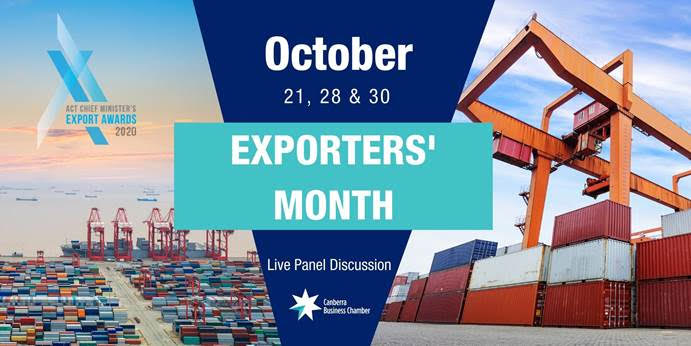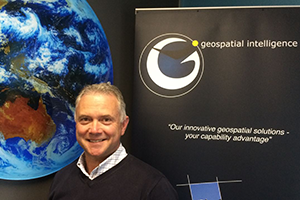 Geospatial Intelligence is a Canberra-based company turning geospatial data into valuable information. The company started in Canberra almost 20 years ago and is fast developing the reputation as the go-to in terms of bespoke tailored solutions using the power of space-based technologies. The idea to create the company was based on years of experience working in both the public and private sectors. Geospatial technologies around the world are used to support industries like defence and security, and the less obvious like agricultural management, environmental mapping and planning and the movement of people.
Geospatial Intelligence is a Canberra-based company turning geospatial data into valuable information. The company started in Canberra almost 20 years ago and is fast developing the reputation as the go-to in terms of bespoke tailored solutions using the power of space-based technologies. The idea to create the company was based on years of experience working in both the public and private sectors. Geospatial technologies around the world are used to support industries like defence and security, and the less obvious like agricultural management, environmental mapping and planning and the movement of people.
Geospatial Intelligence has an extensive portfolio of projects with recent services including the provision of satellite maps and analysis of bushfire damage to aid with recovery in NSW, assisting with tracking illegal fishing, tracking lost cargo and oil spills; to tracking the movement of potential biosecurity hazards across Asia and the potential impact on Australia’s agriculture sector. The majority of this work is done from the company’s head office in Canberra.
Rob Coorey, CEO of Geospatial Intelligence describes the business as providing solutions based on location intelligence. “We use satellites, so a lot of what we do is using space-based technologies that enable our clients to understand context, relationships, patterns and trends. This information is valuable in supporting broad based decision-making.”
Geospatial technology is a generic term used to describe the range of modern tools that contribute to the geographic mapping and analysis of the Earth and human societies. These tools have developed over the centuries. From the earliest mapmakers to the ever-changing field of aerial photography, to the advent of satellites and computers that have developed to process increasingly more complex and larger data sets. To support the ongoing development of these skills in Canberra, Geospatial Intelligence mentors and provides world-class development opportunities for students from a range of disciplines from the ANU. This approach complements the ACT government’s aim to build a vibrant and highly skilled space industry in the ACT.
Getting started
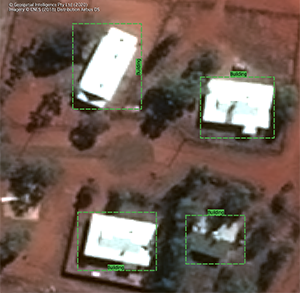 Rob worked for both state and federal government for about 10 years and was then approached by a geospatial software company to open their office here in Canberra. “I worked for the company for nine years working on environmental, defense and security applications. I was then engaged by a large US Defence Prime to run the space sector here in Australia. I was General Manager of Space and Spatial Systems in their Intelligence Surveillance and Reconnaissance unit.”
Rob worked for both state and federal government for about 10 years and was then approached by a geospatial software company to open their office here in Canberra. “I worked for the company for nine years working on environmental, defense and security applications. I was then engaged by a large US Defence Prime to run the space sector here in Australia. I was General Manager of Space and Spatial Systems in their Intelligence Surveillance and Reconnaissance unit.”
Rob says he did that for a few years before setting out on his own.
“I made the decision to establish this company with my wife in 2002, to undertake geospatial work with the aim of being responsive, agile and extremely client-focused.”
“We've managed to survive the teen years through some hard times.”
Rob gives a lot of credit for this to his wife. As a chartered accountant, Rob says that she managed the finances, taking the company through the good and the hard times and everything in-between. “Without her, I don't think we would have survived,” says Rob.
Rob says that people often ask him how you go from being a startup to a successful SME?
“They think the technology is the key to our success, but it really has nothing to do with technology and everything to do with people. You need very good advice on accounting, tax, R&D, good legal support and to surround yourself with good people to share your vision.”
He says the company had good external advice on everything from insurance to risk mitigation, and the company itself is comprised of a wonderful team of very talented professionals.
“You can have the best technology in the world, but you won't go anywhere unless you've got that ring of support around you. I really believe that,” says Rob.
“Supporting good ideas is really important but I think that startups also need to appreciate how important these advice networks are,” says Rob.
“Getting to the commercialisation stage, and more particularly the export stage, is so much more complex than just having great technology or product.”
Geospatial Intelligence does a lot of research and development in-house, with the focus being on Artificial Intelligence and Machine Learning. Rob says this focus is to meet their internal needs and to meet the complex requirements of their clients. For us, necessity has been proven to be the ‘mother of invention’.
“If you have the right culture within your organisation, your people will come up with really good ideas that need to be fostered and developed. This is key to successful growth and it needs to be supported,” says Rob.
Geospatial Intelligence has been doing work overseas since its early days and like most export-oriented businesses is focused on growing this part of the business.
Rob has worked with Austrade over the years and he said he has learned some important lessons, particularly from a trade mission to the US in 2018.
“Every place we went whether a government facility, NASA, a major US Prime, I asked the same question; what do you see were the key factors that contributed to securing that large project? I was informed that the US government has a requirement that if the private sector is able to meet the requirements of a contract, then it will usually be outsourced. The premise being that this principle will help grow industry, skills and employment.”
“Many businesses feel that the opposite happens in Australia,” says Rob.
Geospatial Intelligence has two offices; one in Queensland and the head office in Canberra. The company employs about 18 people who are a mixture of full time, part time and casual employees.
The company also supports local graduates and brings on interns from the ANU; they are usually final year IT graduates, although they have also been interning law graduates for the last 15 years.
“We bring them on board to give them some experience in private enterprise and dealing with the day to day issues related to doing business in a complex environment. We have an in-house lawyer who mentors these students and they get involved in a wide cross-section of issues,” says Rob.
“The opportunity to work with the technology we use is rare in a private sector company, particularly in Canberra,” says Rob.
The future
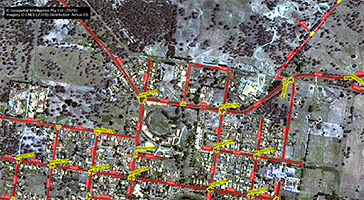 Rob says that around 75 percent of their geospatial work in Australia is with either Federal or State government agencies.
Rob says that around 75 percent of their geospatial work in Australia is with either Federal or State government agencies.
“The Commonwealth and State Governments are our biggest clients.“
“Geospatial Intelligence has previously been engaged to work in South America through a subcontract with a major European Prime,” says Rob.
Rob believes that the opportunities are endless, but the challenge is always being well-positioned to take advantage of them.
The day before this interview, for example, Rob said that the company had been invited by the UK Government, Department of International Trade to be part of London Tech Week (Virtual); a global initiative attracting companies from around the world.
“We were selected because of our mobile app development focuses on location intelligence and innovative risk assessment capability.”
“The application is for mobile devices and looks at threats and risks. It's perfect for the pandemic and post-pandemic traveller,” says Rob. The application was developed a few years ago when we were supporting a Government Department who had a number of Australians overseas and were concerned about their safety”.
Rob says that for a number of reasons the application hasn’t yet been commercialised, even though there is clear value to it.
“This isn’t an overnight development,” says Rob. “The UK Department of International Trade have been very supportive in helping us look at export opportunities to the UK and Europe. We're not there yet, but we are in discussions about the pros and cons and we are finally starting to feel that all the work we have put into development is worth it,” says Rob.
Geospatial Intelligence’s commitment to in-house development has seen the company create a lot of Intellectual Property (IP).
“We have developed quite a few algorithms particularly in the areas of Artificial Intelligence and Machine Learning, to collect and analyse open-source data. We have done some work for a State Health organisation during the SARS and bird flu outbreaks using open source information to track its movements around the globe, to enable them to plan for a potential outbreak.”
“There is so much data around that, when used properly, it allows us to do identify some interesting trends and do some really interesting analysis. We can use space-based technologies to deliver information to your mobile phone in real time.”
“Imagine that you are walking around Budapest and there is a robbery in the street near to you. You would want to know about it! We look at where a person is and where the threat, risk or the danger is; whether it's an earthquake or robbery or whatever, and we bring the two together. We have a patent pending on the technology in the UK, the US and in Australia.”
The trick, according to Rob, is knowing how to make sense out of so much data, and they do this in a diverse range of industries.
“We've done a lot of work around biosecurity issues. Swine flu is a problem in Southeast Asia at the moment and the industry is keen to track its movements because of potential threats to the local industry. So, it’s a big issue for them.”
“We live in a world which is constantly changing, so having a way of actually utilising data to inform key decisions, is really valuable.”
The current challenges
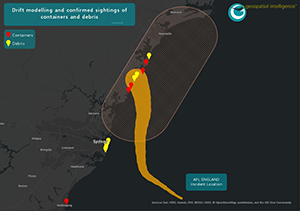 “We really are a technology company,” says Rob. While we work face-to-face with our clients, we can operate digitally and virtually really well and have been doing this for quite a while, and the company is still getting a lot of requests for satellite imagery and processing.”
“We really are a technology company,” says Rob. While we work face-to-face with our clients, we can operate digitally and virtually really well and have been doing this for quite a while, and the company is still getting a lot of requests for satellite imagery and processing.”
“I think people are sitting down at computers and critically thinking about their businesses. They want to know how their plantations are growing, or what the water usage is on a particular farm. A number of mining companies who can't get their people out in the field to do their surveys, are asking if they can use space-based technology to overcome the problem.”
“We have been quite busy engaging with people with specific problems and have seen a lot of really interesting requests for assistance coming through.”
Rob said that while this side of the business has been growing and understandably, there appears to be a small number of government contracts that have been put on hold until after the pandemic because of the need to physically view data or infrastructure.
“A positive thing to come out of the pandemic is that it has been good impetus for further innovation on the particular application that we have been developing over the last couple of years.”
“When the world settles back into its new normal and people want to start travelling again, we think they are going to be particularly sensitive to threats and risks. So, we are seeing that applications like ours might be able help with this current issue, and clearly others also see the value of relevant technology too,” says Rob.
New opportunities
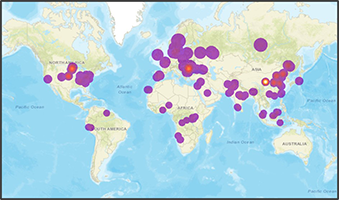 “The pandemic has made a lot of people who were reluctant to use technology, much less reluctant. I think that e-commerce is going to be a big opportunity for us. We are looking at ways to streamline how people buy things from us – not something we have really thought about before.”
“The pandemic has made a lot of people who were reluctant to use technology, much less reluctant. I think that e-commerce is going to be a big opportunity for us. We are looking at ways to streamline how people buy things from us – not something we have really thought about before.”
“We are considering how we better utilise e-commerce. It is not necessarily the typical way we did business in the past, but I think it will become far more commonplace across all sorts of industries,” says Rob.
Rob has a bit of a laugh when he says that even during the current circumstances some suppliers still want signatures on paper.
“We are dealing with European companies on a daily basis and some still want my signature on a piece of paper. It takes a while for some companies to change the way they do things, but it will have to change at some point.”
Some of the lessons
Rob says that while the current focus is the UK, the company continues to do work in New Zealand and to follow up on other international opportunities.
“As a small company you have to make the decision to pursue international work early on, because it can be complex and comes with a range of risks.”
“To me there are two reasons why you explore export options. Either, the company is doing well and you want to expand and diversify the business, or, the business is surviving but you need to chase different options in order to grow.”
“The risks in exporting are many. You need to consider how you employ and manage people in a different country, whether there is a market for your product, what the competitor landscape looks like, and how you overcome the fact that no one actually knows your company overseas. Not really knowing a country’s business ecosystem presents a range of challenges, and it is often difficult to know where start and how to get traction.” says Rob.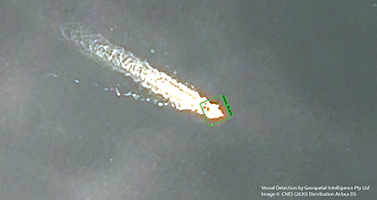 As a small business Rob believes that he has to try and mitigate as many of these risks as possible before he actually invests to export in a different country.
As a small business Rob believes that he has to try and mitigate as many of these risks as possible before he actually invests to export in a different country.
“The financial challenge is to sustain the business at home while trying to grow the international side of it.”
“The good thing about a market like the UK is that they are English speaking and have similar financial systems to Australia.“
Rob says that the other positive thing about the UK is that their economy and legal system are also not that dissimilar to Australia’s. This all helps us to mitigate and manage the risk,” says Rob.
The thing that Rob finds most important in managing risks is to seek the right advice.
“In relation to the UK market, I look to both the Australian government and the UK Government for assistance in answering some of our questions.” says Rob.
Rob says he remembers one of the first books he read after leaving his government job was Jack Welch’s book about his success at General Electric.
“Welsh said that there are two types of companies, ones that are growing or ones that are declining; and he is right. It is that simple, you need to find ways to grow or you die,” says Rob.
“When you create products, you can keep innovating and developing updated or new things for sale. The service industry is somewhat different,” says Rob.
“When you are providing services, there's only so much you can do while remaining true to your core skill set, so it can be quite a risky proposition for a business, particularly in our industry, to rely on services alone.”
Rob said this is the driver behind developing IP and location-based applications like the tracing app that can provide a whole range of new services.
“We saw a need in the market and we wanted to fill it with niche products. However, we also wanted to have products on offer that expanded the services we could offer, rather than just relying on the provision of traditional geospatial services. We wanted to innovate, create value and change the way things are done,” says Rob.
An initiative of the ACT Chief Minister’s Export Awards
The ACT Chief Minister’s Export Awards aims to showcase and celebrate the achievements of Canberra region exporting businesses. These Canberra and region businesses transact significant parts of their business activities (legal, accounting, production, research etc.) through the ACT as they develop international markets. The ACT Chief Minister’s Export Awards aims to build the pathway for new and emerging Canberra region businesses seeking to internationalise their business. If you are a new or existing exporting businesses in the Canberra region, you can access a range of support as well as network with other exporting businesses, including:
The ACT TradeStart Program helps ACT exporters to achieve long term success in international markets. The TradeStart program allows the ACT Government to work closely with Austrade and access key Austrade resources such as their export database, trade mission activities, their off-shore offices, intelligence and international connections for the trade and investment activities to support ACT exporters.
The International Business Engagement Program is being delivered by Canberra Business Chamber on behalf of the ACT Government. Its main objective is to maintain, rebuild and find new opportunities for Canberra and region businesses to engage internationally. The program focuses on building the Territory’s exporting community; providing training and support by facilitating seminars and workshops; creating links between local industry and other government support programs; assisting the ACT Government in co-ordination of business trade delegations (outbound and inbound).


